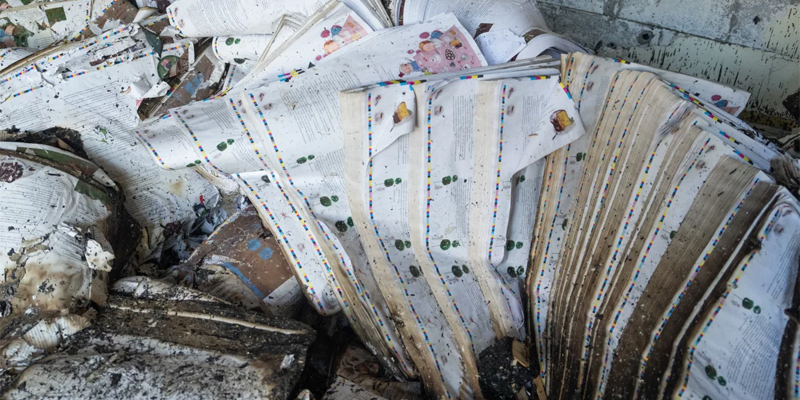
Russian missiles destroyed one of Ukraine’s largest book-printing presses.
Photo by Laurel Chor and NPR
NPR reports that this May, the printing press Factor Druk in the Ukrainian city of Kharkiv was devastated by a Russian missile attack, taking the lives of seven employees and wounding more than 20 others. The attack also destroyed thousands of books and much of the factory’s machinery. The city of Kharkiv, where a majority of Ukraine’s books are printed, has been a frequent target of vicious Russian attacks since the beginning of the full-scale invasion in 2022.
Despite the war, Ukrainian bookstores have seen a recent resurgence, with chains opening more stores and readers flocking to buy books—mysteries, romance, and books by Ukrainian authors have been most popular. This renewed interest in reading makes the destruction of a printing press—a civilian, cultural target—particularly heart-breaking:
“Most of the books were ours,” says Artem Litvinets, editor-in-chief of Vivat, a major Ukrainian publishing house. “The attack felt methodical and deliberate, like cultural genocide.”
This sort of attack that seems to aim squarely at culture has been devastating in Ukraine, which has lost writers to Russian arms and where many see the ideology behind Russia’s invasion as part of a larger assault on Ukrainian literature and language.
It’s also the sort of direct attack on culture and language that has also been a tragic hallmark of the ongoing genocide against Palestinians. In Gaza and the West Bank, writers, journalists, and poets have been killed; libraries and publishing houses have been targeted; and universities and academia have been in the crosshairs of a “scholasticide.”
Most of all, the preservation of a culture requires the survival of its people. As a young Ukrainian, Kuzma Zhytnyk, told NPR: “In order to save the country, we need to save our minds.”
James Folta
James Folta is a writer and the managing editor of Points in Case. He co-writes the weekly Newsletter of Humorous Writing. More at www.jamesfolta.com or at jfolta[at]lithub[dot]com.



















